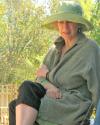Quotes by Margaret Atwood
I grew up in the golden age of Flash Gordon and sci-fi.
When you're writing a novel, you don't want the reader to come out of it voting yes or no to some question. Life is more complicated than that. Reality simply consists of different points of view.
Myths can't be translated as they did in their ancient soil. We can only find our own meaning in our own time.
Within one's own family, money is not the measure of things, unless the person is an absolute Scrooge. Only the most extreme kind of monster would put a price on everything.
I'm a person of whim, and easily distracted. I don't like multitasking. When I'm doing one thing, I like to do just that thing.
Canada is a balloon-puncturing country. You are not really allowed to be an icon unless you also make an idiot of yourself.
Some of our earliest writing, in cuneiform, was about who owes what.
Science fiction is filled with Martians and space travel to other planets, and things like that.
If I pick up a book with spaceships on the cover, I want spaceships. If I see one with dragons, I want there to be dragons inside the book. Proper labeling. Ethical labeling. I don't want to open up my cornflakes and find that they're full of pebbles... You need to respect the reader enough not to call it something it isn't.
If I pick up a book with vampires on the cover, I want there to be vampires. If I pick up a book with spaceships on the cover, I want spaceships. If I see one with dragons, I want there to be dragons inside the book. Proper labeling. Ethical labeling.
There's a difference between describing and evoking something. You can describe something and be quite clinical about it. To evoke it, you call it up in the reader. That's what writers do when they're good.
Writers and books are cheap dates, especially when you compare the cost of a book with a ticket to the opera - or an NHL game.
Some people mistakenly think nature is very nice and benevolent and never betrays.
The society in 'The Handmaid's Tale' is a throwback to the early Puritans whom I studied extensively at Harvard under Perry Miller, to whom the book is dedicated.
I was once a graduate student in Victorian literature, and I believe as the Victorian novelists did, that a novel isn't simply a vehicle for private expression, but that it also exists for social examination. I firmly believe this.
Heroes need monsters to establish their heroic credentials. You need something scary to overcome.
If you feel that there's the author and then the character, then the book is not working. People have a habit of identifying the author with the narrator, and you can't, obviously, be all of the narrators in all of your books, or else you'd be a very strange person indeed.
A reader can never tell if it's a real thimble or an imaginary thimble, because by the time you're reading it, they're the same. It's a thimble. It's in the book.
I'm not interested in cutting the feet off my characters or stretching them to make them fit my certain political view.
I began writing at the age of 5, but there was a dark period between the ages of 8 and 16 when I didn't write. I started again at 16 and have no idea why, but it was suddenly the only thing I wanted to do.
The darkness is really out there. It's not something that's in my head, just. It's in my work because it's in the world.
I have a big following among the biogeeks of this world. Nobody ever puts them in books.
If one of the arguments against eating meat is to do with cruelty and animal intelligence, then lab meat avoids that. There's also the environmental argument for it.
The Eskimos had fifty-two names for snow because it was important to them: there ought to be as many for love.
I tend to feel if people say they're going to do something, they will, if given the chance.






